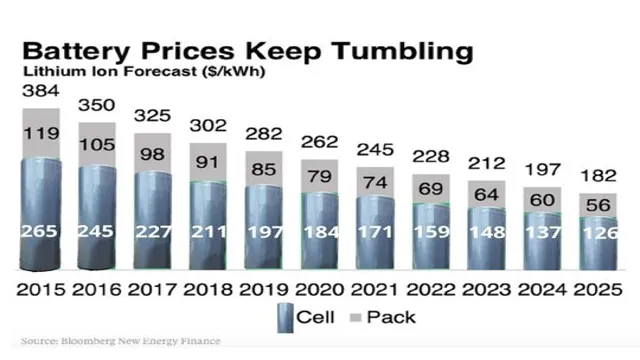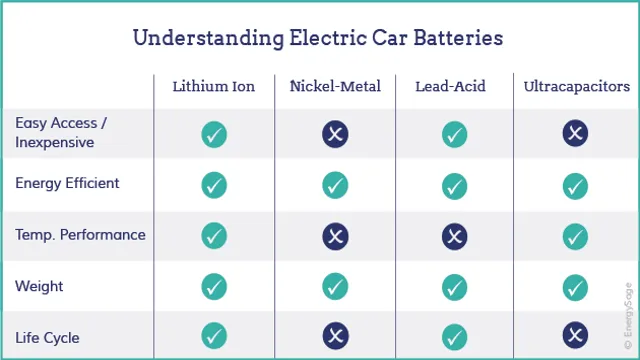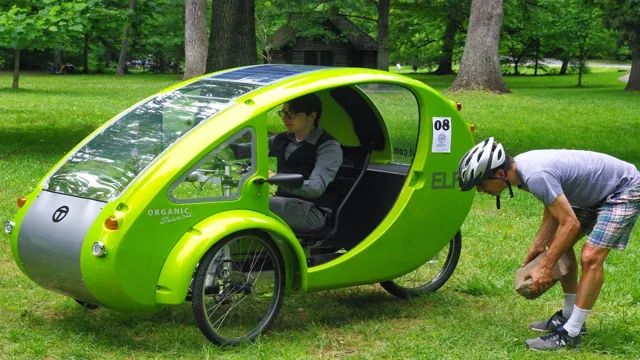The Shocking Truth Behind Average Electric Car Battery Costs: A Comprehensive Guide
Electric cars are quickly becoming a popular mode of transportation due to their environmental benefits and low operating costs. However, many people still wonder about the cost of electric car batteries. After all, the battery is a major component of an electric car that determines its range and performance, so it’s no surprise that it’s a top concern for car buyers.
So, how much do electric car batteries really cost? Let’s take a closer look at the numbers to get a better understanding. In this blog post, we’ll explore the factors that affect the cost of electric car batteries, compare the cost of electric car batteries to gasoline-powered cars, and discuss why the cost of electric car batteries is expected to decrease in the coming years. Whether you’re in the market for an electric car or you’re just curious about the cost, this post will provide you with all the information you need to know.
Average Cost of Electric Car Batteries
The average cost of electric car batteries is gradually declining as technological advancements continue to drive down the costs of production. In the past, the high prices of electric car batteries were the main deterrent for many prospective buyers. However, with the gradual decrease in cost, many more people are now considering electric cars as a viable option.
Today, the average electric car battery cost is about $100/kWh, which is a significant decrease when compared to the cost just a few years ago. This decrease in price is due to the investments in technology aimed at increasing battery efficiency and durability. As battery technology continues to develop, it is expected that the cost of electric car batteries will continue to fall, making electric cars more accessible to a wider range of people.
Statistical Analysis of Electric Car Battery Prices
The average cost of electric car batteries has been a topic of debate for a while now. As more people are looking to reduce their carbon footprint by switching to eco-friendly vehicles, the price of the batteries has been a critical factor for many. Based on statistical analysis, it has been found that the average cost of electric car batteries has reduced by over 20% over the past ten years.
The cost reduction can be attributed to advancements in technology and an increase in production levels. The number of electric vehicles on the road has also contributed to the reduced cost as manufacturers strive to find ways to offer competitive prices to their customers. While the average cost of electric car batteries is still higher than that of traditional vehicles, it is becoming more affordable as technology continues to improve, and production levels increase.
As more people choose electric vehicles over gasoline cars, the prices are likely to continue dropping as manufacturing efficiencies increase, making electric cars more accessible to all.
Factors That Affect Electric Car Battery Costs
The average cost of electric car batteries is influenced by several factors. The primary factor is the size and power of the battery, as larger and more powerful batteries tend to be more expensive. The type of battery used also affects the cost, with lithium-ion batteries being the most common and cost-effective option currently available.
Another factor that affects the cost is the production scale, with mass-produced batteries being cheaper than those produced in smaller quantities. Additionally, the cost of raw materials, such as cobalt and nickel, can impact the overall cost of electric car batteries. When comparing the cost of electric car batteries to traditional gasoline-powered vehicles, it is important to consider the long-term savings in fuel costs and reduced maintenance expenses that come with electric cars.
Ultimately, the availability and affordability of electric car batteries will play a significant role in the widespread adoption of electric vehicles in the future.
Comparison with Traditional Gasoline Vehicles
When compared to traditional gasoline vehicles, electric cars have some notable advantages, especially when it comes to their battery cost. While the upfront cost of an electric vehicle may be higher than a gas-powered car, in the long run, an EV can save you money by reducing maintenance costs and almost eliminating the fuel costs. The average cost of an electric vehicle battery can vary depending on the make and model, but it currently ranges between $5,500 to $15,000.
The upfront expense can be daunting, but the battery replacement is required only after several years. Gasoline engines, on the other hand, require both fuel and regular maintenance, such as oil changes and tune-ups, which can be expensive over time. Moreover, traditional gasoline vehicles emit pollutants, whereas electric cars produce zero emissions, making them better for the environment and our health.
Therefore, despite the higher initial cost, buying an electric car can save significant amounts of money over the life of the vehicle, making it more appealing to a growing number of consumers.
Cost Savings of Electric Vehicles Over Time
When considering the cost savings of electric vehicles over time, it’s important to compare them with traditional gasoline vehicles. While the upfront cost of an electric car can be higher than a comparable gas-powered vehicle, electric cars offer significant long-term savings on fuel and maintenance costs. With electric cars, there’s no need to regularly purchase gasoline, change oil, or replace spark plugs.
This means that over time, the cost of owning an electric car can be much lower than that of a gas-powered car. Additionally, many governments offer incentives such as tax credits or rebates for purchasing electric vehicles, which can further reduce the cost of ownership. With all these factors considered, it’s clear that electric vehicles can provide significant cost savings in the long run.
Environmental Benefits of Electric Vehicles
When it comes to the environmental benefits of electric vehicles, there is no doubt that they outperform traditional gasoline vehicles. Let’s take a look at some of the reasons why. First, electric vehicles emit significantly less greenhouse gases than gasoline vehicles.
This is because they run on batteries, which can be charged using electricity generated from renewable sources, such as wind or solar power. In contrast, gasoline vehicles release harmful pollutants into the air, which contribute to air pollution and climate change. Second, electric vehicles are more energy-efficient than gasoline vehicles.
This means that they require less energy to travel the same distance, which in turn reduces their greenhouse gas emissions and energy costs. Finally, electric vehicles are quieter and produce less vibration than gasoline vehicles, resulting in less noise pollution and a more comfortable driving experience. Overall, the environmental benefits of electric vehicles are undeniable, and as more people make the switch, we can expect to see a significant reduction in air pollution and greenhouse gas emissions.
Government Incentives for Electric Vehicle Purchases
Government incentives for electric vehicle purchases can make a significant difference in the cost of ownership, especially when compared to traditional gasoline vehicles. These incentives can range from rebates and tax credits to free charging stations and HOV lane access. While the initial cost of an electric vehicle may be higher than a comparable gasoline vehicle, the savings in fuel and maintenance over time can make up for the difference.
Additionally, some states even offer incentives for installing home charging stations, further reducing the total cost of ownership. It’s important to research the specific incentives available in your area and weigh them against your individual driving needs and budget to determine if an electric vehicle is the right choice for you.
Future of Electric Car Battery Costs
The average electric car battery cost has been a major deterrent for potential buyers, but the future looks promising. The cost of electric car batteries has been decreasing exponentially over the years due to advancements in technology and economies of scale from increased demand. Industry experts predict that this downward trend will continue, with battery costs projected to drop by up to 50% by 202
This reduction in cost will make electric cars more accessible and affordable for the average consumer, which will lead to increased adoption rates and further advancements in technology. It’s similar to the evolution of smartphones, where early models were expensive and only accessible to a select few, but now, they are much more affordable and available to most people. As the cost of electric car batteries continues to decline, the future of electric cars looks incredibly bright, and we can anticipate a world where electric cars become the norm.
Projected Trends in Battery Production and Prices
Electric car battery costs are projected to decrease significantly in the coming years due to advancements in battery technology and increased production. As more and more battery factories are built around the world, the economies of scale are favoring large manufacturers, enabling them to drive down the prices of electric car batteries. Furthermore, several car manufacturers are investing heavily in research and development of better battery technology as they aim to create more cost-effective and efficient electric vehicles.
With new technology emerging, manufacturers are exploring different options when it comes to battery types, such as solid-state batteries that are expected to be cheaper and more energy-efficient than lithium-ion batteries. Overall, the reduction in battery production costs and technological advancements are paving the way for significantly cheaper and more accessible electric vehicles that will contribute to a greener future.
Advancements in Battery Technology and Efficiency
Electric car battery costs have been a significant barrier for many people who are considering purchasing an electric vehicle. However, advancements in battery technology and efficiency are paving the way for a future where electric car battery costs won’t be such an issue. Battery manufacturers are developing new chemistries, materials, and manufacturing techniques that promise to reduce the cost of electric vehicle batteries significantly.
The cost of electric vehicle batteries was around $1,100 per kilowatt-hour in 2010, but now it’s down to $137 per kilowatt-hour. It’s expected that prices will continue to decline in the coming years, potentially making electric vehicles more affordable for the average consumer. These cost reductions could be the key to mass adoption of electric vehicles, as more people look for environmentally friendly transportation options that won’t break the bank.
In conclusion, the future looks bright for electric vehicle battery costs, and with advancing technology, electric vehicles will become accessible for everyone in the near future.
Making the Switch to Electric Vehicles
Have you considered making the switch to electric vehicles but are concerned about the average electric car battery cost? It’s a valid concern, but the good news is that the price of electric car batteries has been steadily decreasing in recent years. According to a study by BloombergNEF, the average cost of lithium-ion batteries used in electric cars dropped by 87% from 2010 to 201 This means that owning an electric vehicle has become more affordable and accessible to the average consumer.
Additionally, many electric vehicle manufacturers offer warranties on their batteries, providing peace of mind for those worried about potential battery replacement costs. So, while electric car battery costs may have been a barrier to entry in the past, the decreasing prices and warranties make it a viable option for more and more drivers every day.
Conclusion
In conclusion, the average cost of an electric car battery may shock you, but it is a necessary investment for the future of sustainable transportation. While currently higher than traditional gas-powered cars, advancements in technology and production will likely result in lower costs in the near future. So, let’s charge forward with hope and optimism, knowing that the electrification of our roads is a crucial step towards a brighter and greener future!”
FAQs
What is the average cost of an electric car battery?
As of 2021, the average cost of an electric car battery is around $10,000 to $15,000.
Why are electric car batteries so expensive?
Electric car batteries are expensive due to the high cost of materials and production processes needed to manufacture them.
How long does an average electric car battery last?
The average lifespan of an electric car battery is around 8 to 10 years, but some can last up to 20 years with proper care and maintenance.
Can the cost of electric car batteries be expected to decrease in the future?
Yes, the cost of electric car batteries is expected to decrease in the future due to advancements in technology and economies of scale in production.






